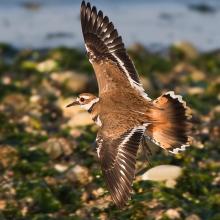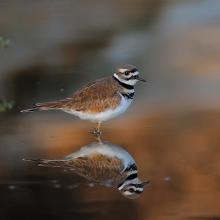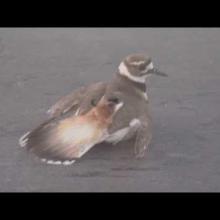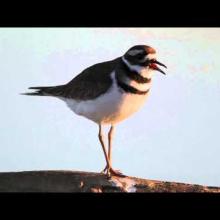

Join BirdNote tomorrow, November 30th!
Illustrator David Sibley and actor H. Jon Benjamin will face off in the bird illustration battle of the century during BirdNote's Year-end Celebration and Auction!
Some birds, such as the Northern Bobwhite, take their names from their songs or vocalizations: "Bobwhite! Bobwhite!" The Killdeer is another bird named for its song: "Kill-dee, kill-dee, kill-dee." There are others. "Poorwill, poorwill, poorwill" calls this Common Poorwill. This bird is the cousin of the Whip-poor-will, another bird that calls its own name.
BirdNote®
Birds That Say Their Own Names
Written by Frances Wood
This is BirdNote!
[Call of the Common Poorwill]
Ever wonder how birds were named? Some, such as the Wilson’s Snipe, were named for people; others for a distinguishing physical characteristic — like the Spotted Towhee; and some for geographic locations, like the California Quail. In a few cases, the bird’s song or vocalization is incorporated into its name. Let’s listen to a few birds that call their names.
[Black-capped Chickadee call]
Do you recognize this “chick-a-dee, dee, dee” call? [Repeat call.] That’s the Black-capped Chickadee.
How about the “bobwhite?” [Northern Bobwhite call] The Northern Bobwhite. Listen again. [Repeat call.]
And this bird? [Killdeer call]
The Killdeer is a common shorebird that often uses this alarm call when predators approach its nest. [Killdeer call.]
And finally, a bird you might hear in the open, arid areas of the West and Midwest [Common Poorwill call].
It’s the Common Poorwill, a nocturnal hunter of insects. The easiest way to locate this species is to listen for its call. [Common Poorwill call.]
To listen to these calls more closely, begin at our website, BirdNote.org. I’m Mary McCann.
###
Calls of the birds provided by The Macaulay Library of Natural Sounds at the Cornell Lab of Ornithology, Ithaca, New York. Black-capped Chickadee recorded by R.S. Little; Killdeer and Common Poorwill by G.A. Keller; Bobwhite by P.P. Kellogg.
Producer: John Kessler
Executive Producer: Chris Peterson
© 2014 Tune In to Nature.org July 2016/2020 / June 2022 Narrator: Mary McCann
ID#072805namesKPLU names-01b









